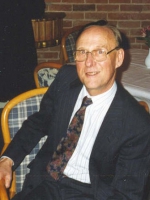Hylton Smith

Affiliation
Country
United Kingdom
Hylton Smith’s (1927 – 2001) multifaceted wealth of knowledge made him an asset to ICRP and a valuable colleague in his profession. He graduated Newcastle University in 1951 and completed his PhD at Edinburgh University during his first appointment in the field of clinical biochemistry.
In 1969, Smith relocated to Scotland, where he assumed the role of Principal Scientific Officer at the Chaplecross establishment of the United Kingdom Atomic Energy Authority (UKAEA). In this new position, he was introduced to radiological protection, exploring areas such as the radiochemistry analysis of environmental samples, biological indicators of radiation exposure and human metabolism of radioactive materials. He did significant work surrounding strontium and actinides, exploring the decorporation of such materials.
Smith became a member of the National Radiological Protection Board (NRPB) in 1973 as the head of the Biological Department, with direct oversight of areas spanning the metabolism of radioactive materials, cytogenetic indicators of radiation damage, terrestrial ecosystems, and non-ionising radiation. Before his retirement, he joined the ICRP as a Scientific Secretary, where he had a wide range of responsibilities, extending to areas outside the scope of science. These included organising and financing meetings of the Commission, the committees, and the various task groups. As a non-profit organisation, the Commission is dependent on the contributions of international, national and charitable organisations. One duty of the Scientific Secretary to acquire these contributions and manage the finances of the Commission.
Smith worked hard to maintain the scientific and editorial standards of ICRP publications and satisfy the commercial needs of the Commission's publishers, and in 1988, he negotiated the arrangements needed to register the Commission as a charity. Throughout the years Smith achieved and maintained a substantial international reputation. He served as a consultant to the United Nations Scientific Committee on the Effects of Atomic Radiation (UNSCEAR). He also represented ICRP at the regular meetings of UNSCEAR and meetings developing the Basic Safety Standards of the relevant United Nations (UN) bodies. He participated in the European Late Effects Project and the coordination of European biology research programs. He served as a member of the Technical Assessment Group advising the Australian Government on the clean-up of the sites used for British nuclear weapons testing. Until his death, Smith was a member of an expert panel involved in the Compensation Scheme for Radiation-linked Diseases, which provided compensation to radiation workers who develop cancer, possibly due to their employment.
Smith ensured he made the time to nurture his hobbies, and had a vested interest in walking, gardening, bird watching and cycling. Colleagues always alluded to his kind-hearted personality and the level of professionalism he exudes. His policy was to take 'all reasonably practicable steps' to get things right. Smith was a valiant practitioner of radiological protection and a valuable member of ICRP.
REFERENCES:
https://ui.adsabs.harvard.edu/abs/
Journal of Radiological Protection, Volume 21, Issue 3, pp. 307 (2001).